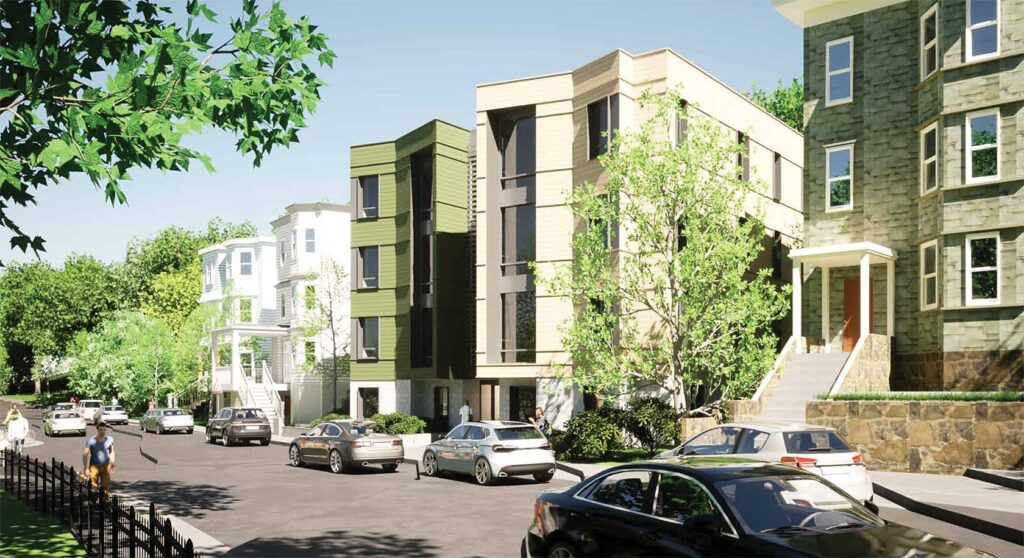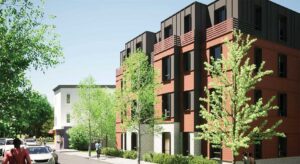
Affordable housing, historic preservation, and open space in Boston will get a $38 million boost through the approval of 52 projects to receive funding through the Community Preservation Act.
Roxbury, Dorchester and Mattapan scored big in this round, racking up nearly $21.2 million in project funding, over half of the total amount.
Those projects could mean a lot for the communities they’re in, said Sandra McCroom, president and CEO of Children’s Services of Roxbury.
“What it will mean for us, is really what it means for the community,” said McCroom.
Her organization is receiving about $1.1 million total in CPA funding for preservation efforts at the group’s historic headquarters and the creation of a green community space behind the building.
The Community Preservation Act, signed into statewide law in 2000, allows municipalities to create a local Community Preservation Fund, supported by property taxes, to pay for affordable housing, historic preservation and open space and recreation projects.
Boston voters approved the creation of its local fund in 2016, which created a 1% surcharge on residential and commercial property taxes.
One project that will receive funding under this round of CPA awards is a Highland Park development that, as currently designed, will create 20 units for affordable homeownership at 75 and 86 Marcella St.
“I think it’s a nice addition to the neighborhood because there are lots of vacant lots there. By filling these lots and creating more housing — especially affordable homeownership housing — we’re basically enhancing the quality of the neighborhood,” said Kamran Zahedi, president at Urbanica, the Roxbury-based company developing the project.

One project that will receive funding under this round of CPA awards is a Highland Park development that, as currently designed, will create 20 units for affordable homeownership at 75 and 86 Marcella St. in Roxbury. RENDERING: COURTESY URBANICA
That project, which is slated to receive nearly $3 million in what he described as gap financing, is currently going through its permitting process with the city, which he said he anticipates will take about six months. Construction, he estimated, would take another 18 months or so.
For affordable housing projects, like the one on Marcella Street, the CPA is an important resource as one of a handful of state and city funding sources for this sort of work, Zahedi said.
That funding is especially important as the city and region struggle with having enough housing that residents can afford.
The Warren Group, which tracks real estate and financial data nationwide, found that, in March, the median price for a single-family home in Greater Boston was $756,000. The median price for a condo was $650,000.
“For the workforce, for regular people that have a middle-income, it’s really not that many choices and that many opportunities to buy their first home,” Zahedi said.
And, according to the 2024 Greater Boston Housing Report Card, an annual report released by the Boston Foundation, 23% of Greater Boston homeowners were cost-burdened — or paid more than 30% of their monthly income on housing — in 2023. Those numbers were especially high for Black residents, 32% of whom were cost-burdened.
The funding is also supporting open space projects across the city. A quarter of the funds, about $9.5 million, will support projects focused on green space and recreation; over half of that chunk of the funding is targeted at projects in Mattapan, Dorchester, Roxbury and Mission Hill.
That money will support projects both improving open spaces and creating new ones. Funds will support climate mitigation features, create increased connections between spaces and pursue general upkeep and beautification measures.
For residents in Mattapan, about $161,000 of the Community Preservation Act funding will mean the creation of a new community garden on River Street, something Vivien Morris, a Mattapan resident and coordinator of the nearby existing Kennedy Community Garden, said will take important steps to bring gardening access to more residents across the city.
According to GrowBoston, the city’s office of urban agriculture, as of last spring, waitlists for community garden plots across the city varied widely but reached as high as 158 people. Few had no waitlist at all.
“Making these new community gardens accessible is very important, and it’s also showing that the city is hearing the voices of the people,” said Morris, referring to outreach she said that GrowBoston did last year to see what priorities residents had.
Alongside the funding for the new Mattapan garden, the latest round of CPA funding will support two other community gardens.
Those spaces are important for increasing access to healthy food — something Morris said is especially important in a community like Mattapan, with an overwhelming majority population of color and a distinct immigrant community.
“Many of those people are with limited financial resources. We have a large immigrant population in our community who have faced many difficulties in the past and have seen those difficulties rise more recently. And we see more people looking for places where they can get more affordable food,” said Morris, who also founded the Mattapan Food and Fitness Coalition.
The gardens also will help build community connections. Seven years ago, Morris and others in her community created the Edgewater Neighborhood Association. Much of the community-building needed to set that organization up was already done because of connections made through the community garden.
“The garden became that place where people got to build deep relationships with people that they didn’t know before, that lived in their immediate neighborhoods,” she said. “That became one of the key reasons why we were able to very successfully build a neighborhood association.”
And the connections through the green space created more green space, Morris said. When the city offered another piece of nearby land, they turned it into a food forest, a space that’s open to everyone, where plants like blueberry bushes, strawberry plants and cherry trees can be harvested by any member of the community.
“We were able to do that because the city made that plot of land available, and the community members said, ‘We have a garden in our community. What can we do that makes that healthy food available and accessible to everyone?’” Morris said. “That’s why we built the food forest.”
And at the Children’s Services of Roxbury headquarters, on Dudley Street, CPA funding will provide about $751,000 to turn a parking lot behind the building — which McCloom, the group’s president and CEO, said is currently largely used for storage — into a community recreation space.
That plaza will host plantings and seating and will serve as a spot for the group to run some of its programming, as well as to welcome community members into a green space — a resource McCloom said is much needed in a neighborhood that often has more limited tree cover and faces worse urban heat effects.
“Any sort of green space that we can create, any kind of environmental area that is safe for kids and families is a huge contributor to the community,” she said.
That funding is paired with another $357,000 that will support historic preservation efforts at the building, which used to be a trolley exchange for horse-drawn trollies connecting Dorchester and Roxbury.
The preservation effort will work on repair and maintenance of the façade, work McCloom described as “maybe not so sexy” but crucial.
“It’s important to preserve buildings like that because they have such a rich history,” she said.
Projects seeking funding in the 2026 round of Community Preservation Act funding can submit an eligibility determination form — the first step in the process that opens up the possibility of filing a proper application — with the city by August 29.






